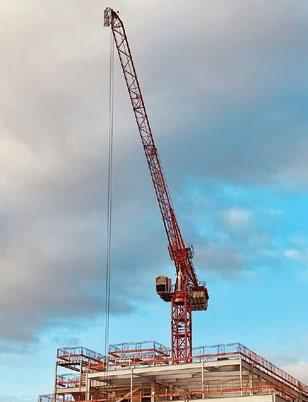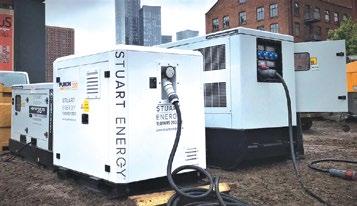
4 minute read
Bowmer + Kirkland Pioneering makes huge savings
Bowmer + Kirkland Pioneering makes huge savings
One of the early adopters and hugely involved in the onsite trials of the PUNCH Flybrid flywheel technology was contractor Bowmer + Kirkland and its group crane manager Dave Shooter. Speaking of how he became involved with the product he said: “I was immediately interested in the product and keen to try out the new technology. The results were astounding. We could not believe the savings in carbon emissions and fuel consumption when the Flybrid was used in conjunction with either mains power or a genset.”

“Any reduction in generator size counts. Even before using the PUNCH Flybrid Power 200s we were making sizeable savings from using more efficient equipment. For example, the Terex CTLH 192-12 we hired from Select has a 25kVA smaller generator specification than its previous model. This may sound very small but if it saves four litres per hour, on a 50 hour week that is 200 litres, over a 45 week contract that is 9,000 litres saved, when fuel was 63p a litre that was £5,670 and 23 tonnes of carbon saved!”

“The same is happening with the SAE P40 mastclimbers we have on the MediaCityUK contract in Salford which start up at about 40 amps and then run at 9.8 amps. Most mastclimbers start up at 55 to 60 amps and then run at 14 to 16 amps. The P40 - supplied by Lyndon SGB - wasn’t designed as an ‘eco model’ but is just the next generation model with newer technology. Having just one machine on a job means there isn’t a great benefit but when there are 23 on site as on the MediaCity contract, the benefits of a smaller generator and therefore less fuel usage is multiplied.”
“The two 300kVA generators used for the 23 mastclimbers have now been downsized to 200kVA saving £75 per week rental over 120 weeks which is £9,000. The fuel saving on both generators is seven litres per hour over a 50 hour week that is 700 litres for both generators. With diesel at 55p a litre which is the price when we first started looking into this, the saving was £46,200. With fuel rising to £1.50 per litre that is now a total saving of £126,000!”

“On our Friargate site in Coventry we had two luffing jib cranes - a Terex CTL 272 and a CTL 282 - from Select Plant, each with a Flybrid Power 200 installed between the generator and crane. Each crane would usually use a 300kVA generator however using the Power 200s reduced this to one 200kVA unit. Over the 78 week hire period we saved over 40,000 litres of fuel and over 106 tonnes of CO2 - the equivalent of almost 18,500 car commutes into Coventry (based on a 40mpg car travelling 20 miles per day).”
“The twin passenger hoist on the Vita student accommodation block in Coventry downsized its two generators from 200kVA to 100kVA using one Flybrid unit. Over 37 weeks it saved 64,509 litres of fuel and almost 170 tonnes of CO2 - the equivalent of almost 30,000 commutes into Coventry.”
“In total using the Flybrid Power 200s on the two sites in Coventry we have saved over 100,000 litres of fuel which at £1.55 a litre is more than £160,000 and the equivalent of almost 50,000 car commutes in CO2.”

“Between June 2021 and June 2022 on seven pieces of kit - six tower cranes and one hoist - we have saved £129,466 in fuel and 407.13 tonnes of CO2,” says Shooter. “And the frustrating thing at the moment is that we are one of only a few contractors that have adopted this technology. Imagine the total savings that could be made if every tower crane, hoist and mastclimber in the UK, Europe or world used this technology.”
In Conclusion
It is very rare that we see a new product that has such profound potential to change without finding at least one or two downsides. From listening to those who have used the equipment and visited the Flybrid facilities, met the team and looked at the equipment, we can see no clear downside no matter how hard we try to introduce some balance. This is truly is a win win product. ■













